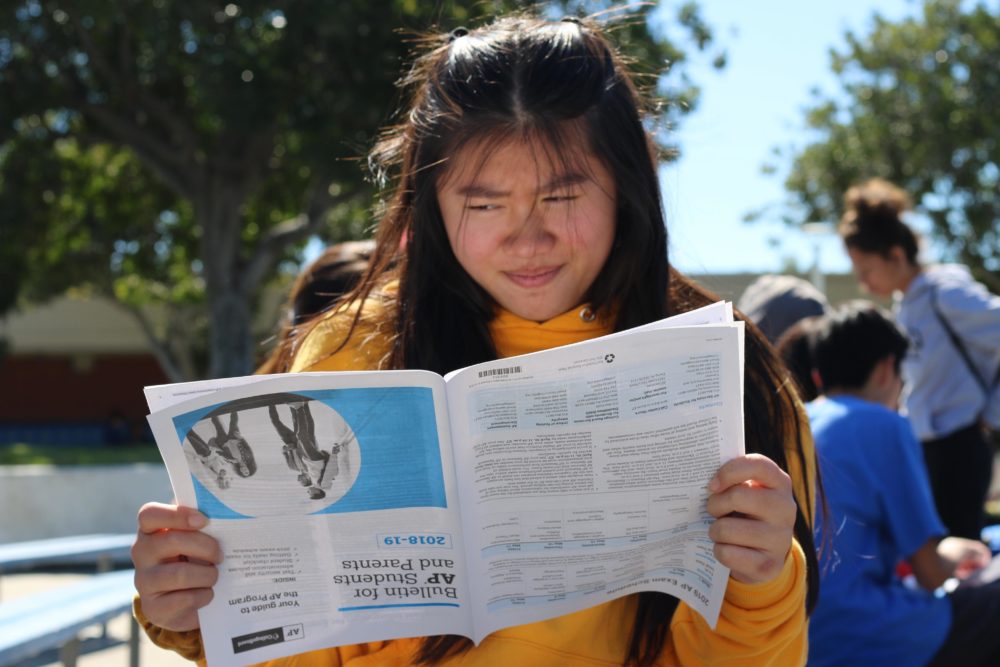
By Justin Hsieh, Staff Writer
Earlier this month, the College Board announced several changes to its Advanced Placement (AP) program that will be implemented in the 2019-2020 school year. The most significant of these changes are a series of new rules, deadlines and fees for the AP Exam registration process.
“Perhaps the biggest change are the registration dates. Rather than getting the registration process started at the end of January and ending at the end of February, we will now be required to have our AP Exam registration process completed by early November,” said Fountain Valley High School (FVHS) Assistant Principal of Curriculum Josh Lamar.
In addition to its new fall registration deadlines, the College Board has created new $40 fees for late registration and for unused or cancelled exams. The College Board has eliminated a $40 fee that schools have previously paid for makeup exams.
“Moving the exam-taking decision toward the start of the AP course will benefit students and boost the learning culture in AP classrooms,” explains the College Board on their website. “When students commit to the exam from day one, they invest themselves in their classes.”
To back this claim, the College Board cites a 40,000-student fall registration pilot program that they ran in the 2017-2018 school year, which they say saw an increase in the number of passing scores, total test participation and participation by low-income students and students from underrepresented minorities.
Not everyone in the AP community agrees with the College Board’s analysis of early registration benefits, however. The College Board has received backlash from many guidance counselors, students and teachers who believe that earlier registration and new fees will not benefit students.
“Overall, I would say that I’m pretty angry about [the new AP rules], because as a student who is currently enrolled in AP classes and intends to take future AP classes, I think this decision will negatively affect me and other students like me, especially since it’s honestly just a money grab,” said sophomore Peter Sears. “We really shouldn’t try to be profiting off of education of kids; it should be purely for education, not for executives making money.”
Criticism of the College Board’s finances is not new. The non-profit organization has long been accused of using its monopoly on college-readiness testing to pay its executives high salaries at the expense of high school students across the country. In 2016, the organization held $1.1 billion of assets and paid president David Coleman $1.45 million, according to tax returns. The greatest source of the College Board’s revenue was AP testing, which surpassed earnings from the SAT exam.
The extent of opposition to the College Board’s recent announcements can be seen in an online petition that has gained over 5,000 signatures to “tell the College Board to put students over profits” by retaining its spring registration deadlines and not adding late and cancellation fees. “The College Board doesn’t care about students – they only care about their bottom line,” the petition alleges.
The College Board has responded to these accusations by arguing that over half of schools offering AP programs already require fall exam commitments, and that its pilot findings show that very few students will incur fees for late orders or cancelled exams. The College Board has also declared its plans to offer new, free resources for teachers and a new online registration system that aims to streamline registration and cut down on exam time.
“The biggest shift for all of us at FVHS will be during the transition from this year’s deadlines and next year’s deadlines,” said Lamar. “The new deadlines ask students to commit earlier… that will be a hard adjustment, but one that we will need to deal with. All schools charge late and cancellation fees, so that shouldn’t be too much of a concern; that is really not a new thing.”
Whether these changes are beneficial or not, what is certain is that they will affect a huge number of students, teachers, and parents in the coming year. According to the Washington Post, 89% of high school students in the United States attend schools that offer AP classes. 1.24 million students who graduated in 2018 took at least one AP exam, according to data released by the College Board.
“We’ll walk through this journey together, and with typical Baron patience and grace, we will work through this change and come out just fine on the other side,” said Lamar.





